Find Help
More Items From Ergsy search
-

Honey 'as good as antiviral creams' for cold sores | NHS Behind the Headlines
Relevance: 100%
-
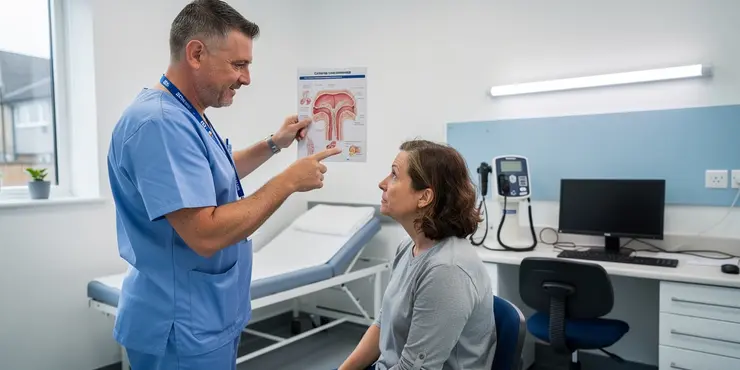
What are Cold Sores?
Relevance: 53%
-

Are cold sores contagious?
Relevance: 52%
-

Is there a cure for cold sores?
Relevance: 52%
-
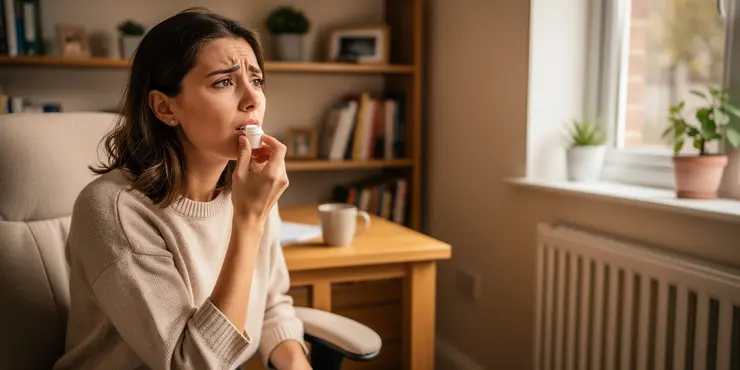
How long do cold sores last?
Relevance: 50%
-

How can I prevent cold sores?
Relevance: 49%
-

What causes cold sores?
Relevance: 47%
-
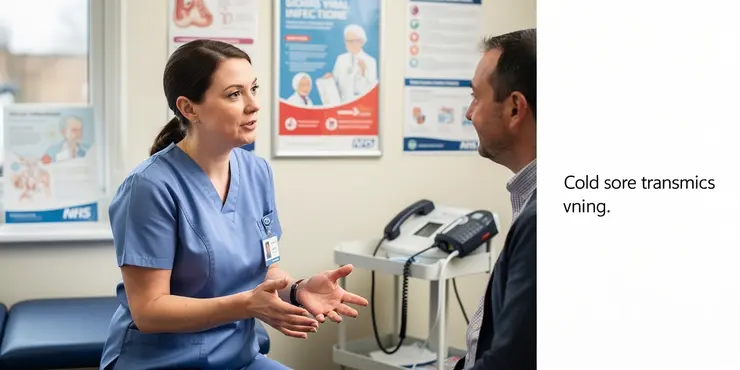
How are cold sores transmitted?
Relevance: 42%
-

What are the symptoms of a cold sore?
Relevance: 41%
-

What is the best way to treat a sore throat from a cold?
Relevance: 41%
-

What triggers a cold sore outbreak?
Relevance: 39%
-
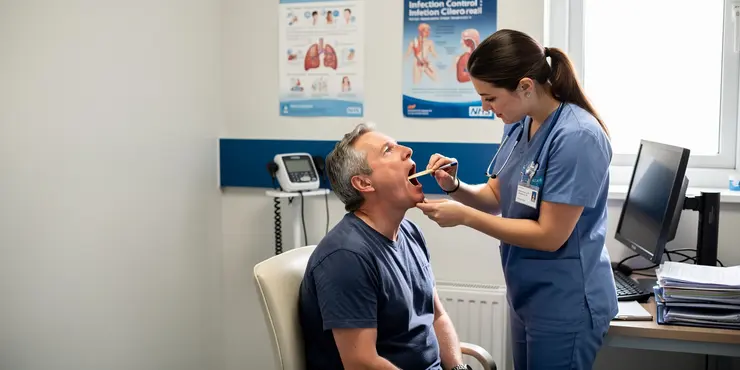
Treating a sore throat
Relevance: 37%
-

Is there a way to cure a cold quickly?
Relevance: 31%
-

Sore throat: what should I do?
Relevance: 30%
-

How can I treat a cold at home?
Relevance: 29%
-
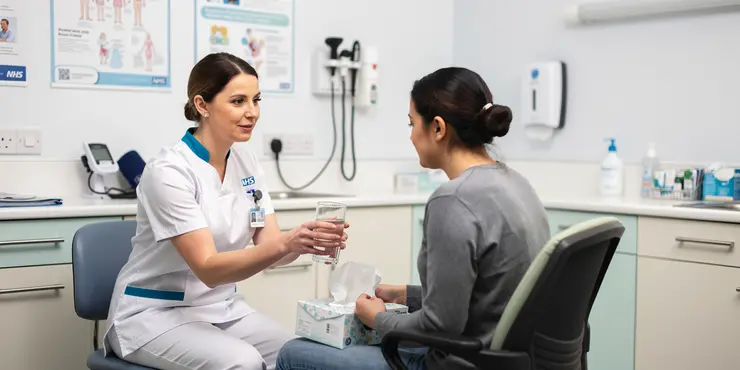
How to treat a cold | NHS
Relevance: 28%
-

Causes of a sore throat
Relevance: 28%
-
Is honey a better alternative to sugar?
Relevance: 28%
-

How to Treat a Common Cold
Relevance: 26%
-

What should you do if you have a cough or cold?
Relevance: 26%
-

What are the common symptoms of a cold?
Relevance: 26%
-

Can H3N2 be treated with antiviral medications?
Relevance: 26%
-

Steroid cream see Topical corticosteroids
Relevance: 25%
-

Should I see a doctor for a cold?
Relevance: 25%
-

Can I take antibiotics for a cold?
Relevance: 24%
-

Is it safe to exercise with a cold?
Relevance: 23%
-

Can cold weather cause a cold?
Relevance: 22%
-

How long does a common cold typically last?
Relevance: 22%
-

How do I treat my child's cold? (9 - 30 months) | NHS
Relevance: 21%
-

Can I use a humidifier to help with my cold symptoms?
Relevance: 21%
-
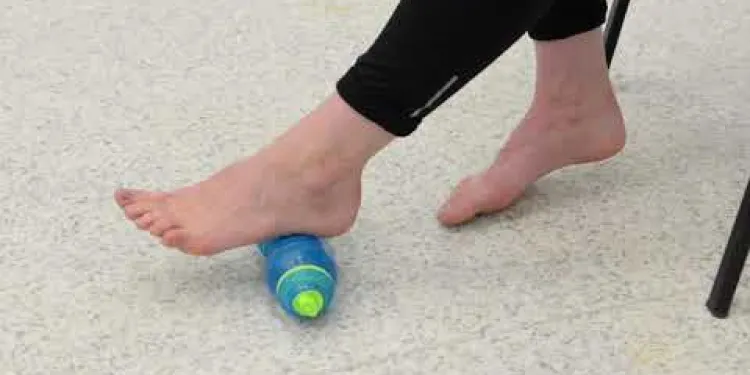
Plantar Fascia Cold Therapy
Relevance: 19%
-
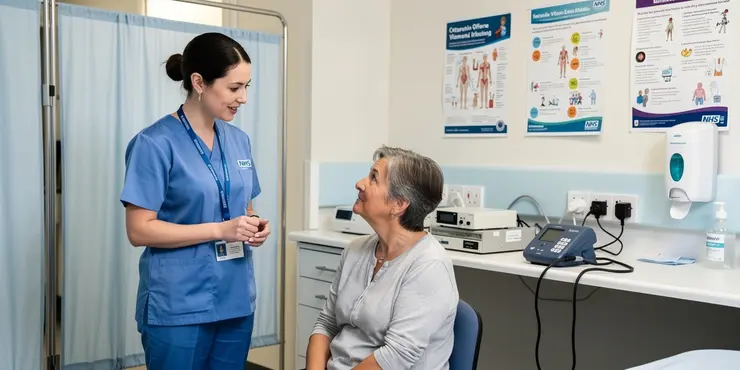
Is Vitamin C effective against colds?
Relevance: 19%
-

Dealing with Common Childhood Illnesses
Relevance: 18%
-

Is it safe to take cold showers during a heatwave?
Relevance: 18%
-
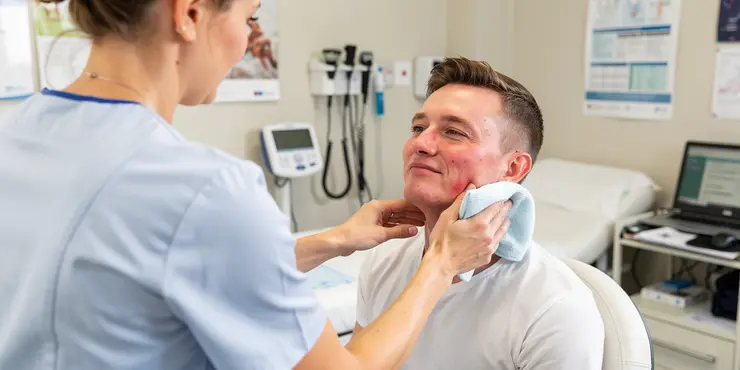
Is it okay to use ice packs or cold showers to cool down?
Relevance: 18%
-
Can orange juice help prevent colds?
Relevance: 18%
-

Can children take the same cold medications as adults?
Relevance: 17%
-

Are there any home remedies for impetigo?
Relevance: 17%
-

How can I prevent spreading my cold to others?
Relevance: 16%
-

Can I receive the Warm Home Discount and Cold Weather Payment?
Relevance: 16%
Honey 'As Good As Antiviral Creams' for Cold Sores | NHS Behind the Headlines
The Claim: Honey vs Antiviral Creams
Recent headlines suggest that honey could be as effective as traditional antiviral creams in treating cold sores. This claim has garnered attention across the United Kingdom due to the potential for a natural and accessible remedy. Cold sores, caused by the herpes simplex virus (HSV), often manifest as painful blisters on the lips and face. Conventional antiviral creams, such as those containing acyclovir, have been the standard treatment for alleviating symptoms and speeding up the healing process.
Scientific Basis for Honey's Efficacy
The efficacy of honey as a potential treatment stems from its natural antiviral and healing properties. Honey has been used in wound care for centuries due to its antibacterial activity, which is attributed to its high sugar content, low pH, and the presence of hydrogen peroxide. Recent studies have explored its antiviral properties, focusing on its effectiveness against HSV. Research indicates that honey can inhibit the replication of HSV, reduce inflammation, and promote faster wound healing, making it a promising alternative to traditional antiviral creams.
Comparative Studies and Evidence
A notable study conducted by researchers compared the effectiveness of medical-grade honey to antiviral creams in treating cold sores. The results demonstrated that honey was as effective as acyclovir cream in reducing the duration of symptoms and promoting healing. Participants in the study reported significant relief from pain and quicker resolution of lesions when treated with honey. These findings support the potential use of honey as a natural antiviral agent for cold sores.
Practical Considerations and Usage
For individuals in the UK considering honey as a treatment option, it is important to use medical-grade honey to ensure purity and efficacy. Over-the-counter varieties may not provide the same therapeutic benefits. Applying honey to the affected area several times a day at the onset of symptoms may yield the best results. However, it is advisable to consult with a healthcare professional before substituting honey for prescribed antiviral treatments, particularly for individuals with severe or recurrent cold sores.
NHS Position and Recommendations
While the NHS acknowledges the potential benefits of honey in treating cold sores, it emphasizes the importance of evidence-based treatments. The NHS supports the use of antiviral creams as the primary treatment option due to their proven efficacy and safety profile. However, for those seeking complementary or alternative treatments, honey may serve as a beneficial adjunct. As research continues to evolve, the NHS remains committed to providing up-to-date guidance based on the best available evidence.
Conclusion
In conclusion, honey shows promise as a natural remedy for cold sores, potentially matching the efficacy of traditional antiviral creams. For residents of the United Kingdom, this offers an intriguing alternative, particularly for those inclined towards natural treatments. Nonetheless, it is crucial to approach this option with informed caution and professional guidance. As more research unfolds, honey may become a recognized complementary treatment for cold sores within the framework of NHS recommendations.
Honey as Good as Antiviral Creams for Cold Sores | NHS News
The Claim: Honey vs Antiviral Creams
Some news says honey could work as well as special creams for cold sores. This is important for people in the UK because honey is natural and easy to find. Cold sores come from a virus and show up as painful spots on the lips and face. People usually use creams like acyclovir to help them heal faster.
Why Honey Might Work
Honey might help because it fights germs and helps heal. People have used honey on cuts for a long time because it kills bacteria. Honey is sugary, has low pH, and has hydrogen peroxide, which makes it special. Some studies now show honey might also fight the virus that causes cold sores. Honey can stop the virus, make swelling go down, and help sores heal quicker.
Study Comparisons and Results
A research study looked at how good honey is compared to antiviral creams for cold sores. The study found honey worked just as well as the acyclovir cream. People in the study said honey helped with pain and made the sores go away faster. This shows honey might be a good natural treatment for cold sores.
How to Use Honey for Cold Sores
If you're in the UK and want to try honey, you should use medical-grade honey. This kind of honey is safer and works better. Put honey on the cold sore area several times a day when you first see it. But it's smart to talk to a doctor before using honey instead of antiviral creams, especially if your cold sores are really bad or keep coming back.
NHS Advice
The NHS knows honey might help with cold sores, but they say creams are best because they work well and are safe. You can try honey as another option, but creams should come first. The NHS will keep updating advice as more research comes out.
Conclusion
To sum up, honey might be a good natural way to treat cold sores and could work as well as creams. This is interesting for people in the UK who like natural things. But make sure you get good info and talk to a doctor first. As more research happens, honey might become part of NHS treatment plans for cold sores.
Frequently Asked Questions
What is the main finding of the NHS study on honey and cold sores?
The NHS study found that honey is as effective as antiviral creams for treating cold sores.
What are cold sores?
Cold sores are small blisters that typically form on or around the lips, caused by the herpes simplex virus.
How was the effectiveness of honey compared to antiviral creams tested?
The study compared honey directly with standard antiviral cream treatments to assess their effectiveness in healing cold sores.
Can honey be used as a first-line treatment for cold sores?
Based on the study, honey could be considered a viable first-line treatment for cold sores.
What type of honey was used in the study?
The study used medical-grade manuka honey for treating cold sores.
Is regular honey from the grocery store effective against cold sores?
The study specifically used medical-grade manuka honey; there isn't sufficient evidence to suggest that regular honey has the same effectiveness.
How should honey be applied to cold sores?
Honey should be applied directly to the cold sore several times a day, similar to how antiviral creams are used.
Are there any side effects associated with using honey on cold sores?
The study did not report significant side effects from using honey on cold sores, but individual reactions can vary.
Can honey be used to prevent cold sores?
The study focused on treatment rather than prevention, so more research would be needed to determine if honey can prevent cold sores.
How does honey compare to over-the-counter antiviral creams?
Honey was found to be as effective as over-the-counter antiviral creams in the study.
Is honey a cost-effective treatment for cold sores?
Medical-grade manuka honey could be a cost-effective alternative to antiviral creams, depending on its availability and price.
Do I need a prescription to use honey for cold sores?
No prescription is needed to use honey for cold sores, but it is advisable to consult with a healthcare provider.
How quickly can honey heal a cold sore?
The healing time can vary, but the study suggested that honey heals cold sores at a similar rate to antiviral creams.
Are there any other natural remedies for cold sores?
Other natural remedies include aloe vera, lysine supplements, and lemon balm, although their effectiveness can vary.
Where can I find medical-grade kanuka honey?
Medical-grade manuka honey can be found in specific health stores and online retailers that specialise in natural health products.
What did the NHS study find out about honey and cold sores?
The NHS did a study. They wanted to see if honey helps with cold sores. This study found something important. Here's what they found:
Honey can help make cold sores better. It might help the sores heal faster. If someone has a cold sore, putting honey on it could be good.
If reading is hard, try using these tips:
- Ask someone to read with you.
- Use apps that read out loud.
- Take your time to read slowly.
The NHS study says that honey helps cold sores just as well as special creams.
What are cold sores?
Cold sores are little blisters that can appear on your lips or around your mouth. They might hurt or itch. Cold sores are caused by a virus. Most people get them when they are feeling sick, stressed, or tired.
To feel better, you can:
- Use a cream from a doctor or pharmacy.
- Put a cold, wet cloth on the sore to help with pain.
- Make sure to wash your hands a lot to stop the virus from spreading to other people.
Cold sores are small bumps that usually show up on or near the lips. A virus called herpes simplex causes them.
How did people check if honey works as well as special creams for viruses?
The study looked at how well honey works to heal cold sores. It compared honey to regular creams used to treat cold sores.
Can honey be used to help with cold sores first?
The study says honey might be good to use first for treating cold sores.
What honey did they use in the study?
They used a special kind of honey.
If reading is hard, ask a friend to help or use a reading app.
This study used a special kind of honey called manuka honey to help treat cold sores.
Can honey from the store help with cold sores?
Cold sores are small blisters that can hurt. People often get them on their lips.
Some people think honey can help make cold sores better. But does the honey you buy from the store work?
It's a good idea to talk to a doctor or a pharmacist. They can give advice on what helps cold sores.
You could also try:
- Ice packs to make it feel better
- Medicines from the pharmacy
- Avoiding spicy food as it may irritate
This study used a special kind of honey called 'medical-grade manuka honey.' This honey is used by doctors. We don't know if regular honey works the same way.
How do I use honey on cold sores?
Put honey right on the cold sore. Do this a few times every day, like you would with special creams from the pharmacy.
Can using honey on cold sores cause any problems?
Honey is usually safe to use on cold sores. But some people might have skin that is sensitive. If your skin gets red or itchy after using honey, stop using it. It is always good to talk to a doctor if you are not sure.
If it is hard to read, you can ask someone to help you or use a text-to-speech tool to listen to it.
The study did not find any big problems when using honey on cold sores. But different people might have different reactions.
Can honey stop cold sores from happening?
This study looked at how to treat cold sores, not how to stop them before they start. We need to do more research to see if honey can stop cold sores from happening.
If you find reading hard, try using tools like audiobooks or apps that read text out loud. You can also ask someone to read with you.
What is the difference between honey and antiviral creams from the store?
Honey works as well as creams from the pharmacy to stop viruses, said the study.
Is honey a good and cheap way to help cold sores?
Manuka honey can help like antiviral creams. It might cost less. Check if you can find it and how much it is.
Can I use honey for cold sores without asking a doctor?
You don't need medicine from the doctor to use honey for cold sores. But it's a good idea to talk to a doctor or nurse first.
How fast can honey make a cold sore better?
Cold sores can heal in different amounts of time. A study found that honey helps them heal as fast as some creams from the doctor.
Can you use natural treatments for cold sores?
Other natural things that might help are aloe vera, lysine pills, and lemon balm. They might work differently for each person.
Where can I get special kanuka honey for health?
You can find special medical manuka honey in some health shops. You can also buy it online from stores that sell natural health items.
Useful Links
This website offers general information and is not a substitute for professional advice.
Always seek guidance from qualified professionals.
If you have any medical concerns or need urgent help, contact a healthcare professional or emergency services immediately.
Some of this content was generated with AI assistance. We’ve done our best to keep it accurate, helpful, and human-friendly.
- Ergsy carfully checks the information in the videos we provide here.
- Videos shown by Youtube after a video has completed, have NOT been reviewed by ERGSY.
- To view, click the arrow in centre of video.
- Most of the videos you find here will have subtitles and/or closed captions available.
- You may need to turn these on, and choose your preferred language.
- Go to the video you'd like to watch.
- If closed captions (CC) are available, settings will be visible on the bottom right of the video player.
- To turn on Captions, click settings .
- To turn off Captions, click settings again.
More Items From Ergsy search
-

Honey 'as good as antiviral creams' for cold sores | NHS Behind the Headlines
Relevance: 100%
-

What are Cold Sores?
Relevance: 53%
-

Are cold sores contagious?
Relevance: 52%
-

Is there a cure for cold sores?
Relevance: 52%
-

How long do cold sores last?
Relevance: 50%
-

How can I prevent cold sores?
Relevance: 49%
-

What causes cold sores?
Relevance: 47%
-

How are cold sores transmitted?
Relevance: 42%
-

What are the symptoms of a cold sore?
Relevance: 41%
-

What is the best way to treat a sore throat from a cold?
Relevance: 41%
-

What triggers a cold sore outbreak?
Relevance: 39%
-

Treating a sore throat
Relevance: 37%
-

Is there a way to cure a cold quickly?
Relevance: 31%
-

Sore throat: what should I do?
Relevance: 30%
-

How can I treat a cold at home?
Relevance: 29%
-

How to treat a cold | NHS
Relevance: 28%
-

Causes of a sore throat
Relevance: 28%
-
Is honey a better alternative to sugar?
Relevance: 28%
-

How to Treat a Common Cold
Relevance: 26%
-

What should you do if you have a cough or cold?
Relevance: 26%
-

What are the common symptoms of a cold?
Relevance: 26%
-

Can H3N2 be treated with antiviral medications?
Relevance: 26%
-

Steroid cream see Topical corticosteroids
Relevance: 25%
-

Should I see a doctor for a cold?
Relevance: 25%
-

Can I take antibiotics for a cold?
Relevance: 24%
-

Is it safe to exercise with a cold?
Relevance: 23%
-

Can cold weather cause a cold?
Relevance: 22%
-

How long does a common cold typically last?
Relevance: 22%
-

How do I treat my child's cold? (9 - 30 months) | NHS
Relevance: 21%
-

Can I use a humidifier to help with my cold symptoms?
Relevance: 21%
-

Plantar Fascia Cold Therapy
Relevance: 19%
-

Is Vitamin C effective against colds?
Relevance: 19%
-

Dealing with Common Childhood Illnesses
Relevance: 18%
-

Is it safe to take cold showers during a heatwave?
Relevance: 18%
-

Is it okay to use ice packs or cold showers to cool down?
Relevance: 18%
-
Can orange juice help prevent colds?
Relevance: 18%
-

Can children take the same cold medications as adults?
Relevance: 17%
-

Are there any home remedies for impetigo?
Relevance: 17%
-

How can I prevent spreading my cold to others?
Relevance: 16%
-

Can I receive the Warm Home Discount and Cold Weather Payment?
Relevance: 16%


